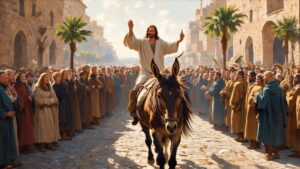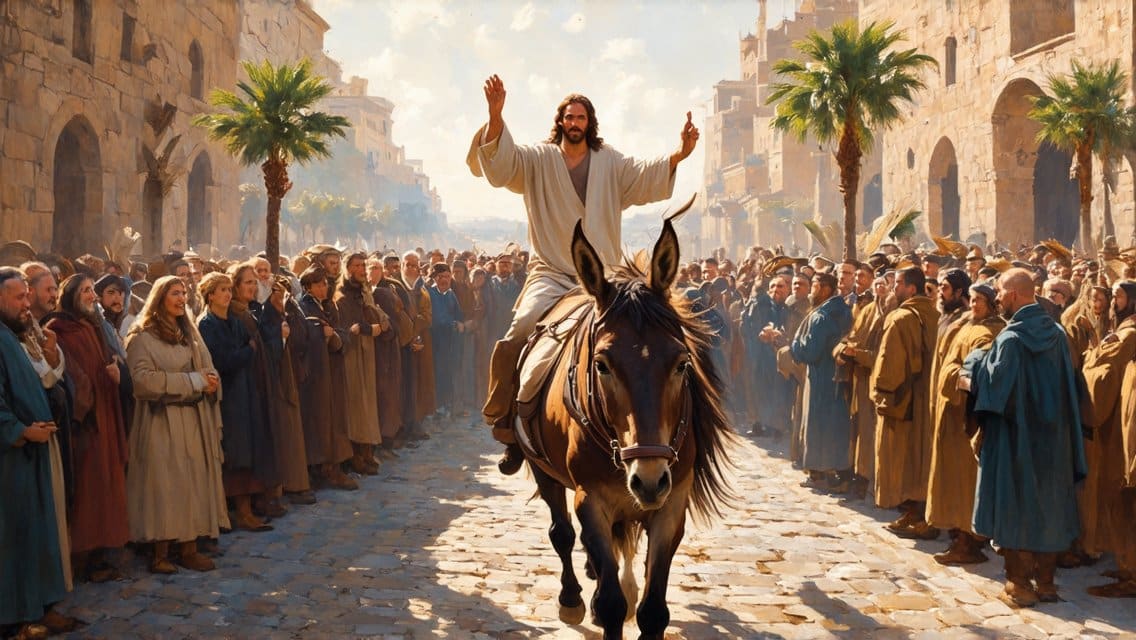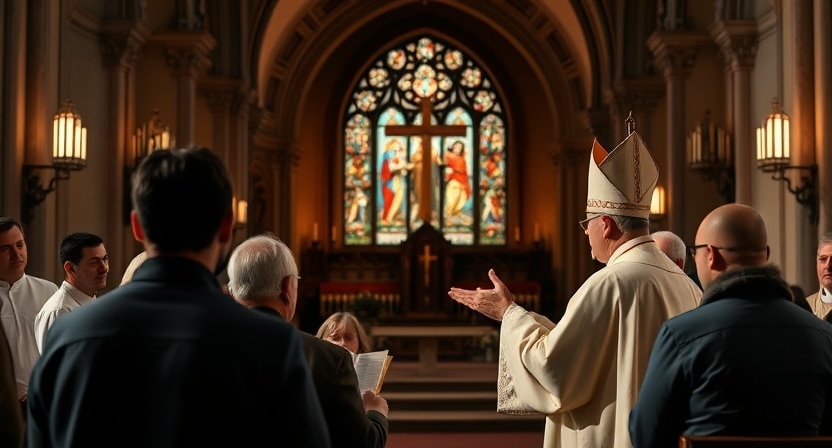PASSION (PALM) SUNDAY
Death of the Good Shepherd
INTRODUCTION AND CONFITEOR
Holy Week, which begins today, is the greatest week in the Church’s year. It is made holy by the death of Christ, the Good Shepherd who died for his flock. He died because of sin. Since we are all sinners, each of us can truthfully say that we had a hand in his death. [Pause]
But Christ died so that we might die to sin and rise to a new life of holiness and grace.
Lord Jesus, you are the sinless one, who suffered the shame and agony of the cross for us sinners. Lord, have mercy.
Lord Jesus, you died so that we might die to sin and live to holiness. Christ, have mercy.
Lord Jesus, you underwent death so that you might open for us the gates to eternal life. Lord, have mercy.
HEADINGS FOR READINGS
Gospel for procession (Matthew 21:1-11). Jesus enters Jerusalem for the last time. ‘He comes, not as an all-conquering warrior, but as a gentle, humble bearer of Good News.
First Reading (Isaiah 50:4-7). The prophet suffers in carrying out his mission. But he is sustained by the firm belief that God will not abandon him.
Second Reading (Philippians 2:6-11). Because Jesus took on himself our human condition, and accepted death on a cross, the Father has raised him up and made him Lord of heaven and earth.
Gospel (Matthew 26:14-27:66). St Matthew shows the passion as fulfilling the prophecies of Scripture, and portrays Jesus, because of his foreknowledge and free decision, as being in complete control of the situation.
At The Mass – 1st Reading Isaiah 50:4-7
4 The Lord GOD has given me a well-trained tongue, that I might know how to speak to the weary a word that will rouse them. Morning after morning he opens my ear that I may hear;
5 and I have not rebelled, have not turned back.
6 I gave my back to those who beat me, my cheeks to those who plucked my beard; my face I did not shield from buffets and spitting.
7 The Lord GOD is my help, therefore I am not disgraced; I have set my face like flint, knowing that I shall not be put to shame.
Responsorial Psalm – Psalms 22:8-9, 17-18, 19-20, 23-24
R. (2a) My God, my God, why have you abandoned me?
8 All who see me scoff at me;
they mock me with parted lips, they wag their heads:
9 “He relied on the LORD; let him deliver him,
let him rescue him, if he loves him.”
R. My God, my God, why have you abandoned me?
17 Indeed, many dogs surround me,
a pack of evildoers closes in upon me;
18 They have pierced my hands and my feet;
I can count all my bones.
R. My God, my God, why have you abandoned me?
19 They divide my garments among them,
and for my vesture they cast lots.
20 But you, O LORD, be not far from me;
O my help, hasten to aid me.
R. My God, my God, why have you abandoned me?
23 I will proclaim your name to my brethren;
in the midst of the assembly I will praise you:
24 “You who fear the LORD, praise him;
all you descendants of Jacob, give glory to him;
revere him, all you descendants of Israel!”
R. My God, my God, why have you abandoned me?
2nd Reading – Philippians 2:6-11
6 Christ Jesus, though he was in the form of God, did not regard equality with God something to be grasped.
7 Rather, he emptied himself, taking the form of a slave, coming in human likeness; and found human in appearance,

8 he humbled himself, becoming obedient to the point of death, even death on a cross.
9 Because of this, God greatly exalted him and bestowed on him the name
which is above every name,
10 that at the name of Jesus every knee should bend, of those in heaven and on earth and under the earth,
11 and every tongue confess that Jesus Christ is Lord, to the glory of God the Father.
Verse Before The Gospel – Philippians 2:8-9
8 Christ became obedient to the point of death,
even death on a cross.
9 Because of this, God greatly exalted him
and bestowed on him the name which is above every name.
HOMILY
As far as we can tell, X was a calm, well-balanced, conscientious man going about his administrative job. He was thoughtful and orderly, though somewhat unimaginative. He had a profound respect for the system and for law and order. He was an obedient, loyal, and faithful official of a great state. He served his leader and his government to the best of his ability.
But X’s job was no ordinary job. His job was to organise the mass-murder of the Jews. He did his job well. He exterminated some six million of them. His real name was Adolf Eichmann. When he was eventually tracked down and arrested, he was found to be perfectly sane. This is what frightens us about him. Had he been found to be insane we could understand how it could happen. But no, he was found to be perfectly sane. As far as we know, he wasn’t unduly troubled by guilt, for he apparently slept well and had a good appetite.
It is truly frightening to think that perfectly sane people are capable of doing, not just evil, but very great evil. After all, we look to the sane to save the world from barbarism, madness, and destruction. And now it begins to dawn on us that maybe we have more to fear from the sane that from the insane.
This brings us to the men who put Christ to death. We have always tended to see these as a uniquely evil bunch of men who were acting from the vilest possible motives. But this is a mistake. Even a quick glance at the evidence will show that this is not so. The truth is, dark evil sleeps in us all. This being so, we should not have any great problem in seeing ourselves as well capable of playing the roles of the men who put Christ to death.
The Pharisees: These were austere, religious men, who devoted all their energy to doing good and the study of God’s Law. But they were absolutely convinced of their own rightness, and history shows that such men are capable of the most appalling evil. Examples: the unconverted Paul who praised the killers of Stephen; the Crusades; the Inquisition; the torture of suspects by governments. V
Caiphas: He was perhaps thinking mainly about religious orthodoxy and how easily people get led astray by false messiahs. The Church saw heretics burn at the stake, thinking it was doing a service to the Gospel.
Pilate: He was thinking about his high office and the preservation of law and order at a time of great unrest. He knew that Christ was innocent but he feared that trouble would ensue if he did not give the religious leaders what they wanted. He was also, of course, thinking about his own job. Many people know what to do, but how many do it? At times we all dilly-dally even when we clearly know what we should do.
Judas: Most likely here we are dealing with a disappointed and disillusioned man. But even this character, so maligned down the ages, came to recognise and condemn the evil of what he had done. The killing of an innocent man was something he could not live with. Plenty of people today seem to have no such problem. Think of the abortionists, the terrorists, the killer squads. We all betray our friends at times, and we often betray our ideals.
Peter: Here we have a man who was simply weak and cowardly. Any one of us would probably have denied Christ in the same circumstances. Peter at least shed tears over his denials. We all know our own denials. We refuse to speak up for the unjustly accused or for the truth when pressure is put on us. We prefer to lie or to remain silent. How many of us shed tears over our denials?
The soldiers: They were simply carrying out orders. Eichmann made the same excuse. So they tossed for Christ’s robe! The SS collected the gold fillings, the jewellery, and even the skin and hair of their victims. We too are rather good at blaming others for our sins. ‘I was only doing what I was told,’ says the Union Man, or the Company Man, or the Party Man. We refuse to accept responsibility for our cowardly acts and evasions.
The crowd: It was a highly emotional occasion. They simply got carried away. They didn’t really know what was happening. Do we not often take refuge in the crowd? ‘Everybody was doing it. {didn’t want to be the odd person out,’ we protest.
Holy Week then is not a week for throwing stones at Judas, Caiphas, Pilate, and the others directly involved in the death of Christ. This week gives us an opportunity to look at our own commitment to truth and justice, and at our loyalty to Christ and his Gospel. But in doing this we must not lose sight of the central character in this sordid story, namely, Christ himself. We must look at the light he sheds on the whole dark scene.
Christ shows us that the only way to overcome evil is by good, just as the only way to overcome darkness is by light. He, the sinless one in whom there was no trace of darkness, died a victim of the powers of darkness. But this time darkness did not have the final say. Through his resurrection, Christ’s light shone even more brilliantly than before, and it can never be extinguished again.
Christ loved us to the point of dying for us. He will help us to confront and overcome the evil in ourselves, and then he will make us instruments of his truth, justice, peace, and love in the world.
‘How quickly decent, nice people degenerate the moment their circumstances change. Their virtue suddenly vanishes, and there’s nothing left of their former selves’. (Dostoyevsky).
‘A Pharisee is someone who asks of others more than he asks of himself’ . (Albert Camus).
PRAYER OF THE FAITHFUL
The passion of Christ is still going on. Conscious of our own weakness, and of the roots of evil in our own hearts, let us pray that we may be on the side of Christ. R. Lord, hear our prayer.
The apostles slept while Jesus was in agony: that Christians may be aware of the sufferings of those around them, and respond to them with generosity. [Pause] We pray to the Lord.
For all judges and government leaders: that they may not play the role of Pilate, but work to ensure that in all cases justice is done. [Pause] We pray to the Lord.
For all those who suffer unjustly. [Pause] We pray to the Lord.
That when, through human weakness or whatever, we deny Christ, we may learn from the example of Peter, who was humble enough to acknowledge his sin and repent of it. [Pause] We pray to the Lord.
For local needs.
Let us pray:
Father, grant that through the death and resurrection of your Son we may be able to die to our sins and rise to newness of life. We ask this through the same Christ our Lord.
COMMUNION REFLECTION
Whenever I think of Jesus, what leaps to my mind
is Jesus in the garden of Gethsemane,
drinking the cup of loneliness,
his soul torn with sorrow at his impending death.
And he looks about him for his disciples,
seeking a little warmth and human closeness,
and there they are — sleeping.
All these good people
with whom he had shared his thoughts.
Now in this moment of unbearable agony,
in which he is so openly and wholly human,
he turns to these companions,
hoping to find comfort and support
in any word or gesture on their part,
but they are not with him.
They are sleeping.
This dreadful moment, I know not how,
was impressed on my memory in my early youth,
and if I think of Jesus,
always and unfailingly,
the memory of this moment arises in my mind.
HERMANN HESSE


